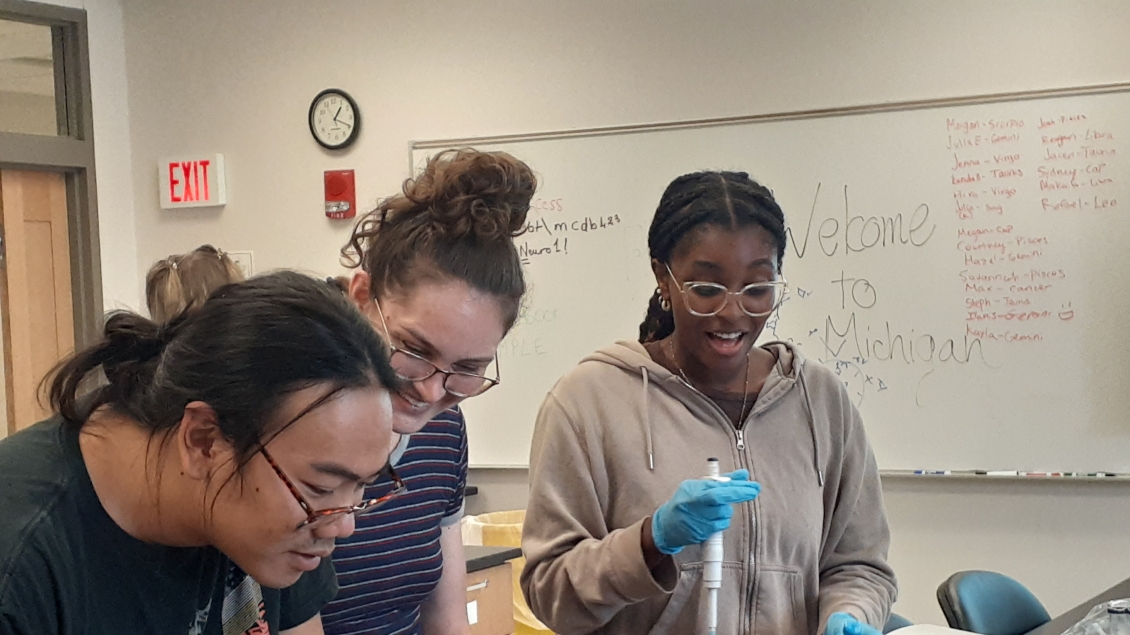
The coursework in the U-M Medical School Neuroscience Graduate Program curriculum equips students with knowledge in basic neuroscience and related disciplines.
A year-long core course, Principles in Neuroscience, is the hub of the curriculum, and emphasizes Neuropharmacology, Neural Development, Neurophysiology and Computational Neuroscience, Sensory Systems, Behavioral and Cognitive Neuroscience, and Clinical and Translational Neuroscience. Students also take a one-semester course in Human Neuroanatomy.
The heart of training in the Neuroscience Graduate Program is laboratory research. Graduate students in neuroscience begin research training upon their arrival on campus, and complete at least three research rotations with program faculty before selecting a laboratory for their dissertation research. These research areas represent seven major sub-disciplines in neuroscience:
- Behavioral and Systems Neuroscience
- Cognitive Neuroscience
- Molecular and Cellular Neuroscience
- Clinical Neuroscience
- Developmental Neuroscience
- Sensory Neuroscience
- Computational Neuroscience
Neuroscience research spans the full range of experimental methods, from molecular biology to human neuroimaging. Students and faculty present their research at local events including the annual Fall Retreat, the Neuroscience Seminar series, in program-sponsored poster sessions and an annual symposium. In addition, students and faculty travel to several national and international meetings, including the annual Society for Neuroscience meeting, to present their research.
Students complete additional laboratory training in cellular and molecular neurobiology during an intensive 2+-week laboratory class before the start of the Fall semester. Courses in statistics and research ethics are required and elective courses are offered across a wide variety of departments and programs allowing students to individualize their training program.
In addition to formal coursework, graduate students in the program attend weekly seminars at which students, faculty, and invited lecturers present their work. The time to degree is approximately 5.8 years.
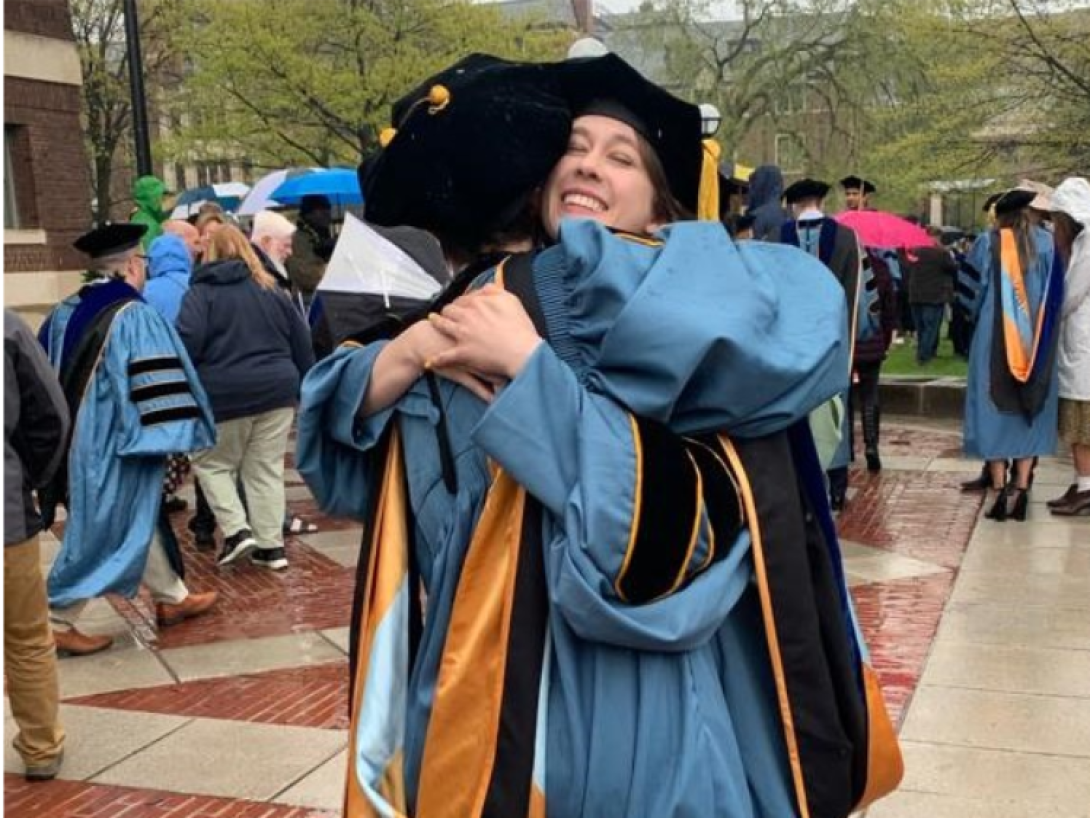
Pre-Term
Neurosci 623, Introduction to Molecular Neurobiology and Neurophysiology: This course is an intense introduction to Molecular Neurobiology and Neurophysiology focusing on cellular and molecular neuroscience. It meets for two+ weeks starting in early August. This "bootcamp" provides students an introduction to graduate school and fosters social interactions between the incoming cohort of students. Topics focus on experimental design and statistics, introduction to Matlab and programming skills, and knowledge and technical advances in molecular neurobiology (basic molecular and protein neurobiology, imaging, and electrophysiology). 3 credits
Fall Term
- Research Rotation(s), Neurosci 800 (PIBS registers under PIBS 600):
All students must perform research rotations for the Fall and Winter terms. Rotations can be full or half term rotations with any affiliated NGP faculty member. Students admitted via PIBS must get approval for full term rotations from PIBS Director. Optional summer rotations are a possibility. - Neurosci 601, Principles of Neuroscience:
Fall Term Principles of Neuroscience Courses: Neuroscience 611, 612, and 613. Sequential modules with each module lasting 1/3 of the semester. The goals for the modules are: to provide students with a broad range of basic Neuroscience background knowledge, to provide students with a sense of how knowledge was obtained, by reading and discussing “classic papers” and to provide students with a sense of where the current frontier is, by reading and discussing very recent papers. This class meets for 4-6 hours each week, with a mix of lectures, discussions, and presentations. The modules constitute the first half of a comprehensive introduction of neuroscience. 1 credit per module- 611, Neuropharmacology:
Covers pharmodynamics and pharmacokinetics; Glutamate, GABA, acetylcholine, dopamine, adrenergic and serotonergic transmission; Opioid Systems; Neuropeptides and a number of other topics. - 612, Neural Development:
Covers Neurogenesis, Neuronal activity and critical periods, axon growth, degeneration and regeneration, synaptogenesis, neurotrophic factors and other topics. - 613, Neurophysiology, Circuits and Computational Neuroscience:
Covers basic neurophysiology concepts, network activity and computational modeling of neurons and neuronal networks; brain function and network interactions in multiple brain regions.
- 611, Neuropharmacology:
- Neurosci 570/571, Human Neuroanatomy:
Neuroanatomy course and lab provides a systematic survey of the structure of the human nervous system, including major pathways, neurotransmitters, and functions. - Neurosci 700, Neuroscience Seminar:
Weekly colloquium series with talks being presented by students in their second and fourth years as well as invited speakers and internal faculty. This is a 1 credit course. - PIBS 503, Research Responsibility and Ethics:
Covers a number of topics related to the responsible conduct of research. Among the topics usually treated are the proper use and care of animals in research, rules for research involving human subjects, accepted standards for recording data and keeping notebooks, distinguishing ethical from unethical practices and a discussion of what type of contribution to a project merits authorship on papers. - Other Program Requirement:
During year 1 or 2 all students who are eligible are required to submit an NSF proposal.
Winter Term
- Research Rotation(s), Neurosci 801 (PIBS registers under PIBS 600):
All students must perform research rotations for the Fall and Winter terms. Rotations can be full or half term rotations with any affiliated NGP faculty member. Students admitted via PIBS must get approval for full term rotations from PIBS Director. Optional summer rotations are a possibility. - Neurosci 602, Principles of Neuroscience:
Winter Term Principles of Neuroscience Modules: Neuroscience 614, 615 and 616. The 3 modules make up an entire semester long introduction to Neuroscience topics, each lasting a third of the semester. 1 credit per module.- 614- Sensory Systems covers auditory system, visual system, olfaction, somatosensation, taste, and other topics as time allows.
- 615- Behavioral and Cognitive Neuroscience, Topics will include learning and memory, motivation, addiction, circadian rhythms, and stress. Behavioral methods will be discussed.
- 616- Clinical and Translational Neuroscience, Covers trinucleotide repeat disorders; movement and psychiatric disorders; epilepsy, Alzheimer’s and other dementias
- Neurosci 700, Neuroscience Seminar:
Weekly colloquium series with talks being presented by students in their second and fourth years as well as invited speakers and internal faculty. This is a 1 credit course. Attendance is required. - Statistics or Elective Course:
- Every student is expected to demonstrate basic proficiency in statistics. This requirement can be satisfied by several different courses, or by previous higher level undergraduate coursework (requires approval to be waived). Can be taken as a candidate level student if approved by the NGP Director. 3 credits
- 3 credits cognate electives are required by Rackham. The electives can be achieved by a variety of courses in Biological Chemistry, Cell and Developmental Biology, Human Genetics, Pharmacology, Physiology, Psychology and other programs and includes Journal clubs. The elective can be taken at either the pre-candidate OR candidate level.
- Neurosci 602, Principles of Neuroscience:
Winter Term Principles of Neuroscience Courses: Neuroscience 614, 615 and 616. The 3 modules make up an entire semester long introduction to Neuroscience topics, each lasting a third of the semester. 1 credit per module.- 614: Sensory Systems covers auditory system, visual system, olfaction, somatosensation, taste, and other topics as time allows.
- 615: Behavioral and Cognitive Neuroscience, Topics will include learning and memory, motivation, addiction, circadian rhythms, and stress. Behavioral methods will be discussed.
- 616: Clinical and Translational Neuroscience Covers trinucleotide repeat disorders; movement and psychiatric disorders; epilepsy, Alzheimer’s and other dementias
- Other Program Requirement:
During year 1 or 2 all students who are eligible are required to submit an NSF proposal. - Qualifying Exam:
Taken after the first year course work has been completed.
- Statistics or Elective Course:
If statistics was not taken in the First year, the statistics requirement must be met in the second year. Electives are also available in the second year. The electives can be achieved by a variety of courses in Biological Chemistry, Cell and Developmental Biology, Human Genetics, Pharmacology, Physiology, Psychology, Computational Medicine and Bioinformatics, and a variety of other departments. - Neurosci 995, Candidate Level Research:
Students register for 8 credits of laboratory research for each fall and winter term until the completion of their degree - Neurosci 700, Neuroscience Seminar:
Students in year 2 present in either Fall or Winter term of the seminar. They meet in groups of two with a faculty mentor for intense discussion of a relevant topic in neuroscience. Each student selects a paper for presentation (20-minute lecture) to the entire Neuroscience Program. Faculty mentor provides assistance in preparing the talk. Students will receive oral feedback from other Program faculty after the talk. This course gives our students outstanding skills for giving scientific presentations. - Graduate Student Instructor (GSI):
One term of teaching is required for a degree in Neuroscience. This is completed during the second year. NGP students typically teach in Neuroscience, Biology and Psychology as well as selected basic science departments within the Medical School.
Following the Preliminary Examination, the Executive Committee evaluates each student's overall progress. The Committee considers the results of course work and research rotations, performance in the Neuroscience 700 seminar, and results of the Preliminary Examination.
Once a student is deemed qualified to be a candidate for the Ph.D., he/she is recommended to the Graduate School. When the University and the Graduate School requirements have been met, the candidate will receive a "Candidate's Certificate" and may proceed to form a Dissertation Committee and undertake a Ph.D. research project.
Additional Program Requirements after Candidacy (see details below)
- Formation of PhD Thesis Committee
- Preparation of Thesis Research Proposal (NRSA format) for Presentation to Dissertation Committee
- PhD Thesis Committee meetings every 6-8 months
- Yearly Completion of IDP
- Attendance at required NGP events (NGP retreat, Michigan Neuroscience Conference, welcome picnic)
- 4th year thesis research seminar in NS700
The student, in consultation with their mentor, will provide a one paragraph summary of their thesis research and nominations for members of the Dissertation Committee to the Executive Committee in Fall of their second year. A minimum of five faculty members must constitute the Dissertation Committee (at least three of whom must be members of the Program). Students will also identify a Thesis Committee Co-Chair.
After approval by the Executive Committee, the student will meet with his/her Dissertation Committee and present the Specific Aims for their full thesis proposal along with a brief description of preliminary data and proposed experimental methods to obtain suggestions and feedback from their committee members. The student will then prepare a full NIH F31-style research proposal on their thesis research to present to their committee in Winter/Spring/Summer of their second year. All eligible students are strongly encouraged to submit this F31 proposal to NIH in their 2nd or 3rd year for funding of their thesis dissertation project.
Semi-annual meetings (every 6-8 months) of the Dissertation Committee are expected, providing strong intellectual and personal support to help the student complete a first-rate dissertation. It is the responsibility of the mentor and Dissertation Committee to keep the NGP program leadership informed of the student’s progress by completing thesis committee meeting reports.
The requirements for a completed thesis are determined by the Dissertation Committee in consultation with the research mentor and the student. Research comprising published manuscripts as well as additional unpublished material are often included as chapters in the thesis. In addition, a scholarly introductory chapter and final discussion chapter must be included to provide an integrated dissertation. The student must present a public seminar on the dissertation research followed by an oral defense of the dissertation before the Dissertation Committee.
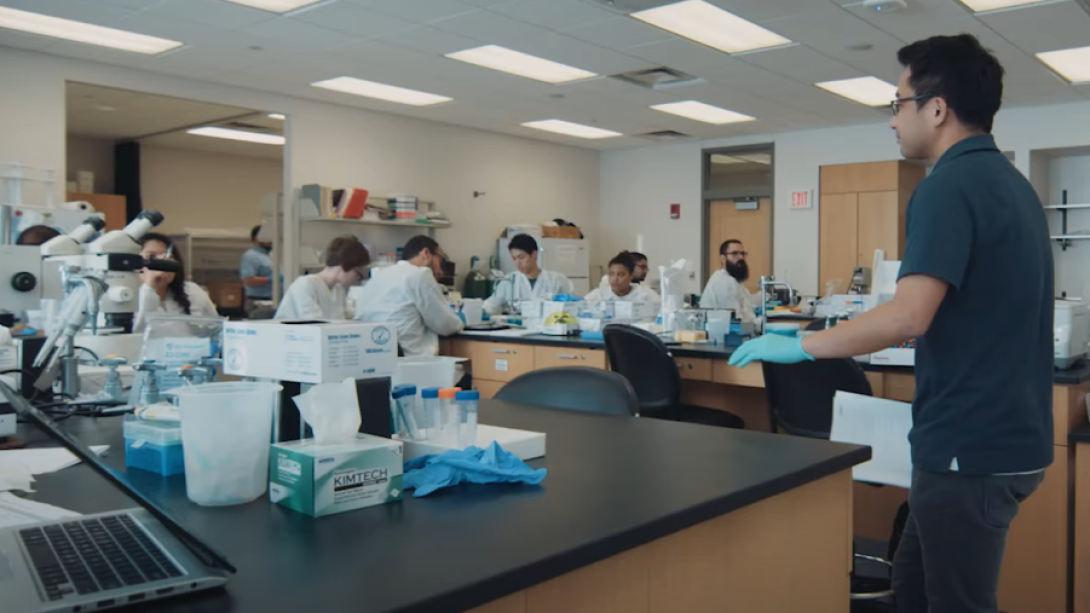
NGP students in lab classroom
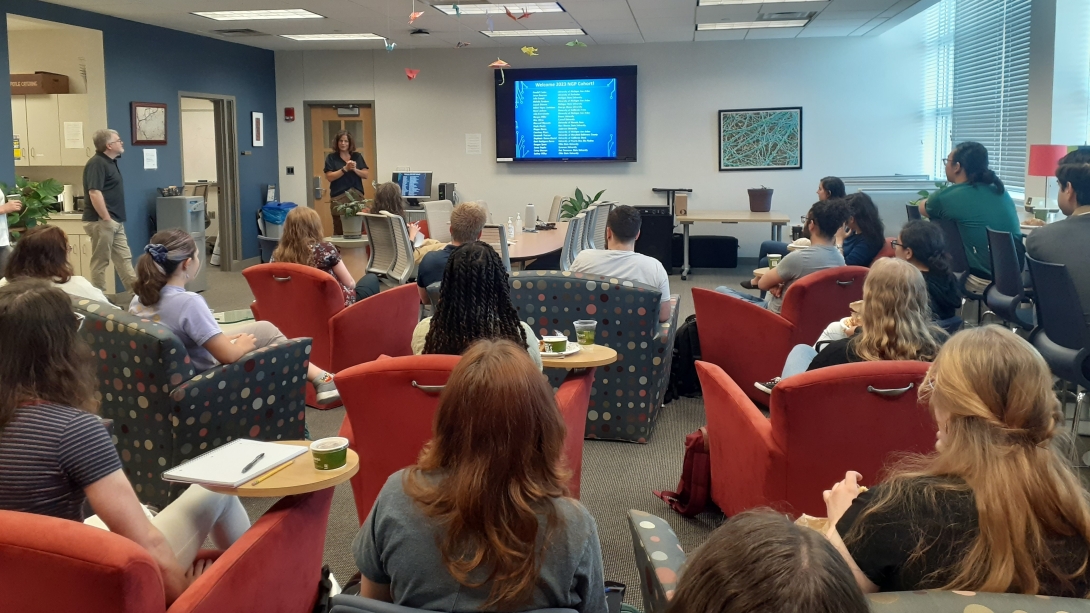
NGP student orientation in the RPR (Resting Potential Room)
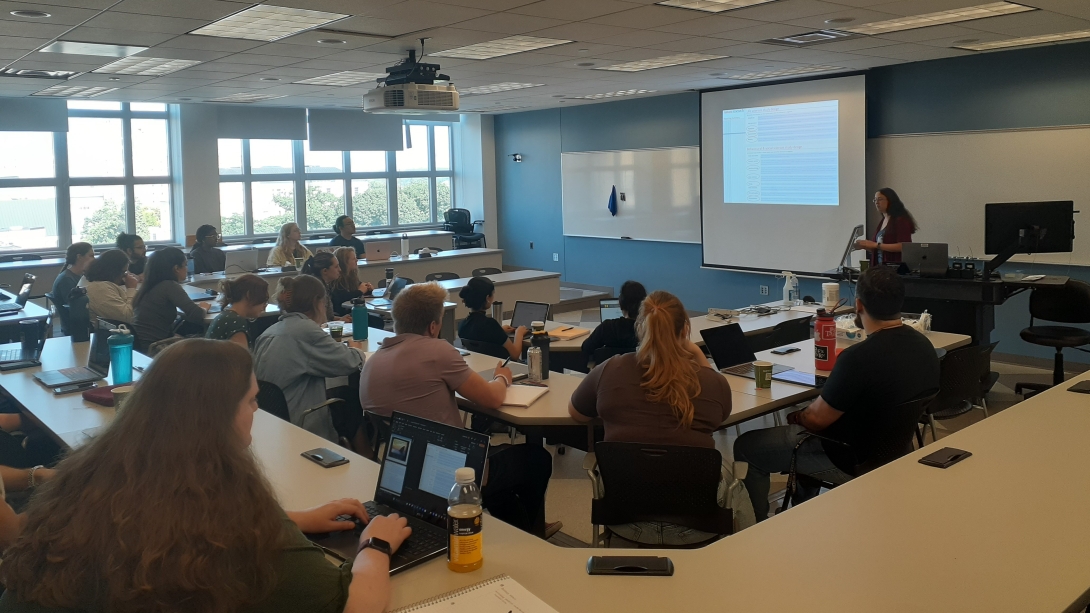
NGP students in classroom
A Graduate Instructor teaching students
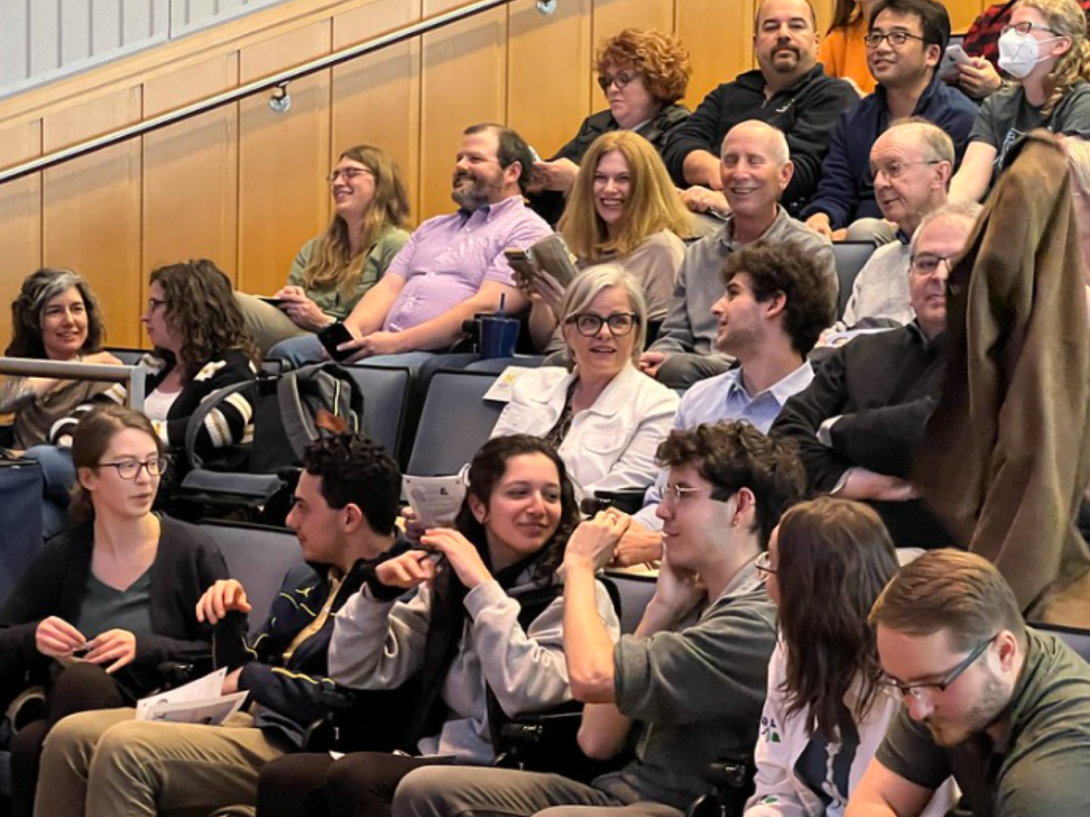
NGP students and faculty enjoy a seminar in Palmer Commons Forum Hall